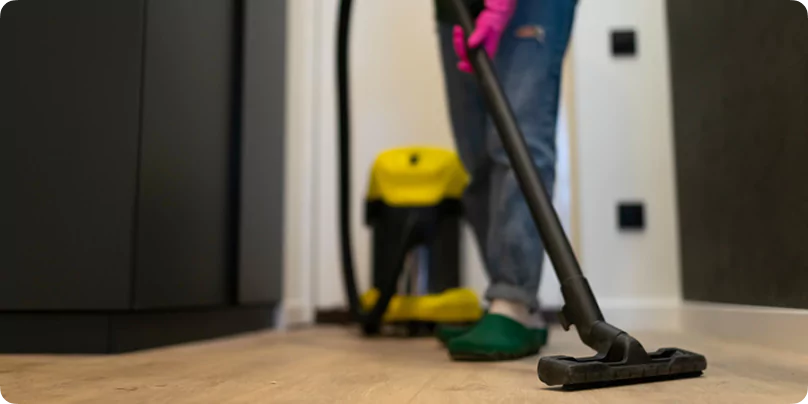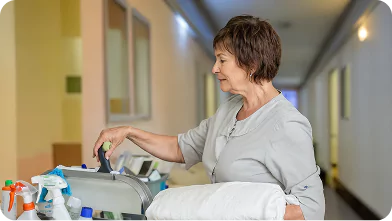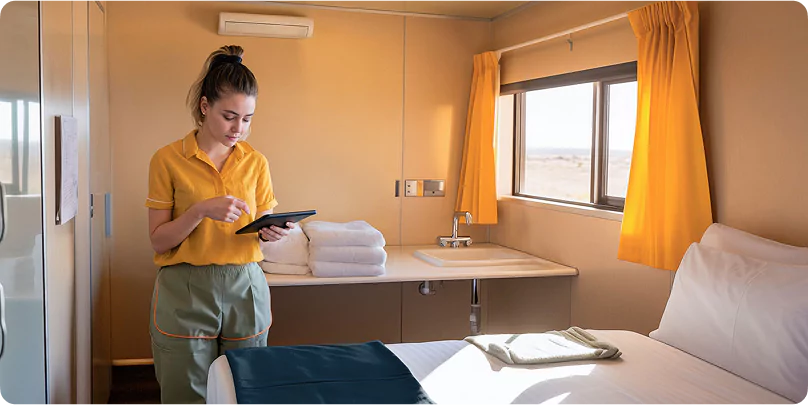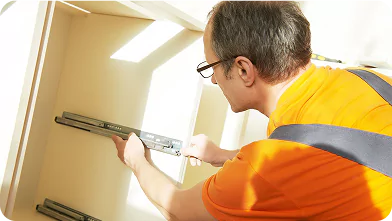;)
;)
Remote workforce accommodations present unique housekeeping challenges that manual and paper-based approaches struggle to address effectively. After 12-hour shifts in demanding environments, workers return to their rooms expecting clean, comfortable spaces that support rest and recovery. However, non-digital housekeeping methods often fail the staff responsible for meeting these expectations consistently, especially during high-occupancy periods or shift changes.
The operational impact extends beyond guest satisfaction to affect core business functions. Inefficient manual housekeeping processes can delay room turnovers, potentially leaving arriving workers waiting for accommodations after lengthy travel. Handwritten task assignment and paper-based tracking create information gaps between housekeeping teams and front desk operations. Maintenance issues identified during cleaning rounds may not reach maintenance teams promptly when relying on paper documentation, extending the time rooms remain out of service. Fortunately, as we'll explore in this article, advanced digital solutions now offer practical ways to solve these everyday problems and make life easier for everyone involved in maintaining clean, comfortable accommodations at remote camps, lodges and villages.
While all remote operations can gain value from advanced housekeeping technologies, certain types of facilities stand to benefit most from these enhancements:
In all these scenarios, paper-driven housekeeping systems become bottlenecks that ripple throughout the operation, affecting worker satisfaction, operational efficiency, and overall camp management. The digital technologies we'll explore next have been specifically designed to address these challenges in remote accommodations, with proven results in even the most demanding environments.

Leading camp management technologies offer powerful mobile capabilities that transform housekeeping operations by putting technology directly into the hands of field personnel. These advanced systems enable camps to eliminate paper-based processes, capture data in real-time, and create seamless communication between teams by equipping supervisors and housekeepers with tablets or smartphones. This mobile approach supports multiple critical functions throughout the housekeeping workflow, from initial room assessment to final status updates, fundamentally changing how housekeeping teams operate in remote environments.
To properly assess the impact of digital solutions, we should first examine the traditional process they enhance. Housekeeping "walkdowns" (named for the literal walking through facilities to inspect room status) are a process some remote camps use to systematically verify room occupancy status and determine cleaning priorities. Not all facilities conduct formal walkdowns, as practices vary widely across different remote accommodation operations. Some camps forgo these processes because their existing check-in/check-out systems are reliable enough or because they handle room verification through other means such as radio communications with front desk staff, while others avoid implementing walkdowns specifically because they represent yet another paper-based process that delays actual cleaning work.
For camps that do implement them, walkdowns help housekeeping teams identify which rooms are vacant, occupied, or ready for service without relying solely on checkout records. While check-ins are typically tracked reliably, formal checkout procedures are often bypassed, with camp residents simply departing without notifying staff.
These walkdowns traditionally involve clipboard checklists and manual documentation. The process creates significant delays as staff must physically return paperwork to central locations before cleaning task assignments can begin.
Now, let's look at how mobile walkdown technology transforms this process by enabling immediate data capture and transmission for operations that choose to implement this verification method.
With specialized camp management systems, supervisors or authorized housekeepers can use mobile devices to verify and record essential room information as they move through the facility:
This digital verification happens in real-time, with data flowing instantly to the central camp management system. Beyond eliminating paper transfers, digital walkdowns streamline checkout processes when workers depart without formal notification. Housekeeping staff can immediately identify vacated rooms and trigger cleaning protocols---particularly valuable during crew changes when turnover efficiency directly impacts camp capacity.


Following walkdown completion, advanced camp management systems enable supervisors to leverage mobile tools to efficiently organize and distribute housekeeping tasks. Rather than relying on paper task lists or cumbersome spreadsheets with static room status data, they can use mobile phones or tablets that combine real-time room status information with critical details like upcoming arrivals, VIP guests, and maintenance requirements to optimize task distribution.
Leading digital solutions typically offer mobile workload management capabilities that include:
Supervisors can create and distribute these assignments directly from their mobile devices, with immediate notification to housekeeping staff. This eliminates the delays associated with printing and distributing paper assignment sheets, allowing housekeepers to begin their work more quickly.
The assignment process can accommodate various operational approaches, including:

Once assignments are distributed, advanced solutions enable companies to provide their staff with individual tablets or mobile phones for managing tasks and updating room status in real-time. As housekeepers progress through their assignments, these systems allow them to provide immediate feedback on task completion and room conditions.
These digital solutions can enable housekeepers to:
Supervisors gain valuable insights about their team's performance through these real-time updates, including the ability to see how long staff members spend in each room, identify bottlenecks, and monitor overall cleaning progress throughout the facility.
The value of mobile-enabled solutions like these is that they provide immediate visibility to all relevant stakeholders at the camp, including supervisors, front desk staff, and management. The real-time nature of these updates transforms front desk operations by providing accurate, current information on room availability without the need for phone calls or manual status checks.


During both walkdowns and regular cleaning, housekeeping staff frequently identify maintenance issues that require attention. Advanced solutions enable immediate documentation and reporting of these issues through mobile tools, significantly reducing maintenance response times and resolution delays.
With these specialized technologies, housekeeping staff can use their mobile devices to:
This comprehensive approach ensures proper coordination between housekeeping and maintenance teams, minimizing room downtime while maintaining accurate status information for front desk operations. The photographic documentation provides maintenance staff with clear visual information about issues before they arrive on site, allowing them to bring appropriate tools and parts on their first visit.
The best camp management solutions offer robust quality control capabilities that enable systematic verification of housekeeping standards. These digital tools allow supervisors to:
Quality control can be configured to match operational needs—whether inspecting every room, using random sampling, or focusing on rooms with previous issues. This flexibility ensures operations can implement appropriate oversight without overburdening staff resources.
Equipping housekeeping teams with mobile devices creates a seamless digital workflow from initial room checks to final quality inspections. Without shuffling papers or making phone calls, staff can handle every task—verifying vacancies, accepting assignments, tracking progress, and documenting issues—using tablets or smartphones instead of clipboards and radios. This connected approach yields four key advantages:
Together, these improvements help remote facilities maintain consistent service quality despite challenges like variable occupancy and limited staffing resources.

Leading camp management systems can integrate SMS messaging to improve and streamline housekeeping operations in remote locations. These systems can deliver time-sensitive information directly to mobile devices, connecting staff with cleaning assignments and alerting workers when their rooms are ready. This direct communication approach can eliminate the delays and miscommunications that often occur in large facilities where staff are spread across multiple buildings and radio coverage may be limited. The following sections explore how SMS messaging can facilitate cleaning task management, enable effective staff communication, and enhance the guest experience to create more efficient operations and better service quality.
SMS messaging can give supervisors a direct line to their housekeeping staff for urgent and actionable communications, replacing radio systems and in-person interactions with instant digital communication. Rather than sending routine updates (which would be visible within the system itself), SMS can be reserved for time-sensitive information requiring immediate attention or action.
Advanced solutions can provide two distinct approaches to SMS communication:
This dual approach ensures that standard processes run efficiently via automation while still allowing flexible communication for unexpected situations.
These messaging capabilities can address specific operational scenarios such as:
These capabilities can prove particularly valuable during high-demand periods, when housekeeping teams must respond quickly to changing circumstances. The ability to instantly communicate priorities and changes helps ensure that limited cleaning resources are directed to the most critical needs first.

Beyond internal operations, sophisticated camp management systems can provide valuable communication channels with guests, potentially enhancing their experience while reducing front desk workload. With a sophisticated housekeeping module in place, these advanced technologies can create automated touchpoints throughout the guest stay, including:
The room readiness notifications can prove particularly valuable during busy periods, allowing guests to be immediately informed when their accommodations become available. Rather than waiting in reception areas or repeatedly checking with front desk staff, they could receive direct notifications as soon as housekeeping marks rooms complete. These automated communications can reduce front desk congestion while improving the guest experience.
This coordinated SMS communication approach delivers several high-impact benefits for both housekeeping staff and camp residents:
The mobile-based approaches outlined in this article—digital walkdowns, mobile task management, and integrated SMS communications—work together to solve the fundamental challenges of remote camp housekeeping. Rather than simply digitizing existing paper processes, these technologies create entirely new workflows that eliminate bottlenecks, improve communication, and enhance service quality.
For housekeeping staff, these digital solutions eliminate administrative burdens and provide real-time guidance on priorities, allowing them to focus on their core responsibility: providing clean, comfortable rooms for workers. Supervisors can shift their attention from paperwork and status tracking to quality management and staff development, leading to better service and more efficient operations.
Most importantly, these digital tools help camps deliver consistent service despite fluctuating occupancy, staffing shortages, and rapid crew changes. By connecting housekeepers, supervisors, maintenance teams, and front desk staff in one system, facilities ensure their cleaning operations work as a unified whole. The result? Workers return from demanding shifts to find clean, comfortable rooms ready exactly when needed—supporting the rest essential for their wellbeing and productivity.
If you're looking to implement the digital housekeeping solutions described in this article, SmartLodge offers all these capabilities in a single, integrated platform specifically designed for remote camps, lodges and villages. Our mobile-optimized housekeeping capabilities address the unique cleaning challenges of remote accommodations, putting powerful digital tools directly into your team's hands—whether they're conducting walkdowns, managing assignments, or sending real-time SMS alerts—all designed to keep your camp running smoothly even during the most demanding of times.
See SmartLodge or EnRoute in action by filling out the form and we’ll be in touch very shortly.
We’ve received your message and someone from our team will connect with you soon.